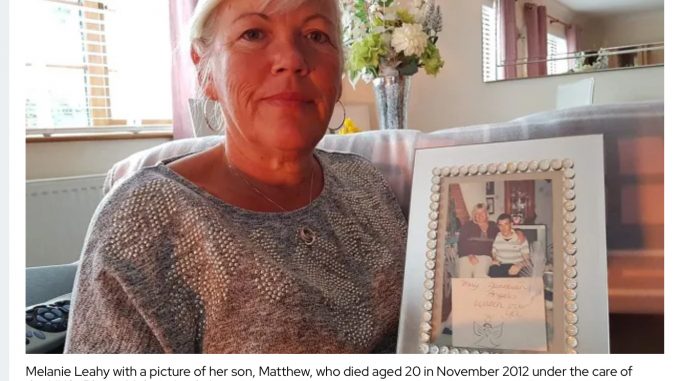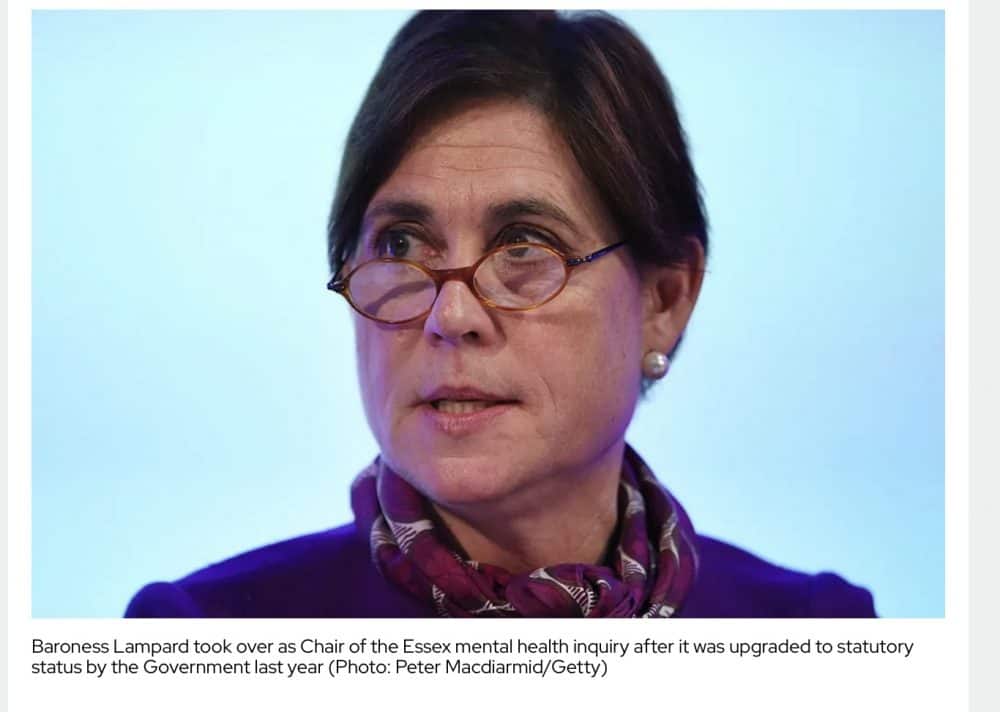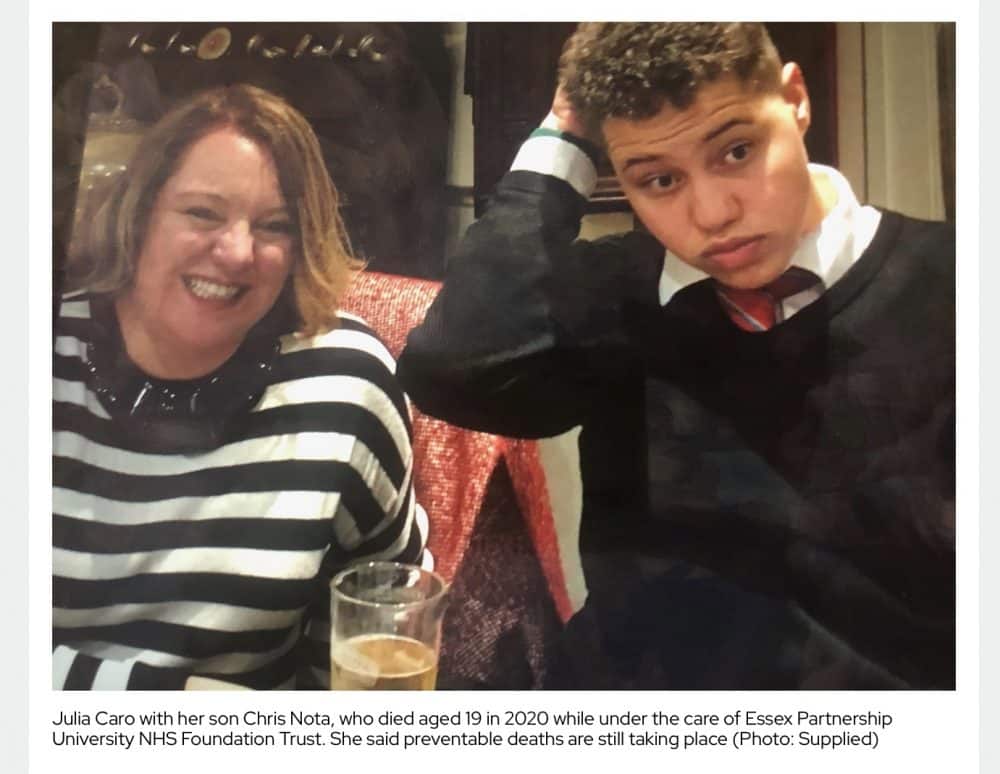
The UK’s largest-ever investigation into mental health services moves to the next stage this week, but bereaved relatives fear more patients will suffer by the time it concludes.
Relatives who lost loved ones while under the care of NHS mental health units in Essex have said patients remain at severe risk while the major inquiry into their deaths moves to its next stage on Monday.
Hundreds of people are expected to apply for Core Participant status at The Lampard Inquiry, which is investigating the deaths of up to 2,000 mental health inpatients under the care of NHS trusts in Essex between 1 January 2000 and 31 December 2023.
The window to apply for the key role in the inquiry process – a core participant may receive disclosure of evidence, make opening and closing statements, and suggest lines of questioning for witnesses – opens at 2pm on Monday until midnight on 20 May.
However, families said they have been left frustrated at the four months it took to publish the inquiry’s terms of reference (TOR) last week and the lack of any timetable outlining when exactly the inquiry will start hearing evidence in public.
The Lampard Inquiry is the UK’s largest-ever investigation into mental health services. It is investigating deaths which took place while patients were under NHS care or within three months of discharge from Essex units. Families also want that the scope expanded to include deaths involving patients who were not admitted in time or whose deaths took place beyond the three month window.
Melanie Leahy, whose son Matthew died in November 2012 at the age of 20 while at The Linden Centre, a secure mental health unit in Chelmsford, told i: “The TORs are not satisfactory. [Health Secretary] Victoria Atkins told [Witham MP] Priti Patel in December she would meet with the families but when that happened only one family stayed in the building and one stayed online. There are 120-plus families in the campaign for justice, but many of them are not included as they are out of the inquiry’s remit.
“The inquiry won’t include those patients who didn’t get a bed, or were struggling for care and died after that three-month period. If they look at those issues as well the inquiry will have to be expanded. For me, personally, it’s a fight for Matthew, but I can’t just ignore everyone else who died.”
Last year The Lampard Inquiry was finally upgraded from an independent non-statutory status, meaning it can compel witnessed to come forward and give evidence on oath, following years of campaigning from bereaved relatives. It will make recommendations to improve the provision of mental health inpatient care across the UK, but the Essex families are concerned that patients are still dying due to poor care and lessons not being learned.

Sophie Alderman died on 19 August 2022, aged 27, while under the care of Essex Partnership University NHS Foundation Trust (EPUT), having applied a ligature in her bedroom while a detained inpatient at Willow Ward, Rochford Hospital, Essex. Her death was as a result of misadventure, an inquest jury concluded this month.
Ms Alderman’s mother Tammy Smith said: “I wish that I could be confident that Sophie’s death would lead to real learning that would keep other families from experiencing the same tragedy, but to learn from an event, the first step is acknowledge where things went wrong, which throughout this process the Trust and its staff have failed meaningfully to do.”
Last month, a jury concluded a man who died while under EPUT care in 2022 could have survived if the right observations were carried out by staff. They had claimed 63-year-old Michael Nolan was “very happy” after being admitted to Basildon Hospital, following a previous attempt to take his own life.
The jury found that there were “serious failures” regarding patient observation, highlighting that “if the observations and engagements had been carried out correctly, there may have been a different outcome”. In addition, the jury also stated that there were “serious concerns regarding the roles and responsibilities of the staff” during the night shift of Mr Nolan’s death.
His son, James, said: “I have been in a state of shock since his passing. He should not have been able to take his own life whilst he was under EPUT’s care. He was meant to be in the safest possible place for him, and yet, he has been taken from us.
“I have lost faith in EPUT as an institution, and I hope that my father’s case will be a stark reminder of how bad things are and how much work needs to be done before we can trust EPUT to adequately care for our loved ones in their time of need.”
EPUT chief nurse Ann Sheridan said: “In the time since this tragic incident we have taken immediate action to strengthen our response to emergency situations on our wards and enhance resuscitation training and support for clinical staff.”
In February, a coroner issued a prevention of future deaths report highlighting a number of areas of concern regarding the mental health support received by an Essex woman prior to her experiencing fatal overdose of drugs and alcohol. Family members found the body of 36-year-old Georgia Dehany-Perkins on Latton Common in Harlow, on 6 September 2022, having reported her missing to Essex Police earlier that day.
Ms Dehany-Perkins had a known history of self-harm, suicidal ideation, and being found as an at-risk missing person, with multiple inpatient admissions for treatment for her declining mental health which was exacerbated by having previously been misdiagnosed with cancer.
She had attempted to hang herself in the bathroom of her bedroom on the mental health ward where she had been admitted in August 2022 following a recent overdose of her medication. It was discovered that Ms Dehany-Perkins had been admitted to a room with an accessible bathroom with a faulty safety mechanism. There had been no risk assessment regarding the suitability of the room before she was admitted.
EPUT chief executive Paul Scott said: “We welcome the progress of the Lampard Inquiry and will do all we can to support Baroness Lampard and her team to provide the answers that patients, families and carers deserve.”

Ms Leahy and other bereaved families have said the longer the inquiry takes to finish the more families will be at risk of losing a loved one.
“We get relatives of inpatients ringing us up in a panic asking for help because there’s no protection. Patients are still dying while everyone is twiddling their thumbs,” she said.
Julia Caro lost her 19-year-old son Chris Nota in 2020 while under the care of Essex Partnership University NHS Foundation Trust, which merged with North Essex Partnership University NHS Trust to form EPUT in April 2017.
She told i: “The inquiry must get started now. People are still dying and that’s what is making me so ill. The Government has delayed things mindlessly while people have died. You hear of some deaths, others you won’t hear about. People are discharged prematurely and go through enormous suffering. It has got to be stopped.”
Some relatives walked out of their only meeting with Ms Atkins last month after complaining that the inquiry’s scope was too limited. The families’ legal team was refused entry. Baroness Lampard also declined to meet relatives’ lawyers when she met them last November, i understands.
“We said we were not a fair representation and walked out,” Ms Leahy said. “You can’t just invite a handful of families – and the invite for one of the families came just 24 hours before the meeting. It was like a Mickey Mouse selection process. It just goes to show how poorly the families who have lost loved ones are being treated.”
A spokesman for the inquiry said as it is independent of both the NHS and the Government, the meeting that took place between relatives and ministers from the Department of Health and Social Care on 26 March was not something that it was involved in. “We were sorry to hear that the meeting did not meet the expectations of the families,” they told i.
Nina Ali, solicitor with Hodge Jones & Allen, the law firm representing around 120 families, said: “The Terms [of Reference] have been met with disappointment by some of our clients. They are nowhere near as comprehensive and inclusive as we advised that they needed to be. However, the inquiry website does state that the chair will seek to hear evidence from current and former patients in addition to bereaved families.
“We will have to see what transpires and work within the framework that we have been given. Monday sees the first step needed to get this Inquiry up and running with an invitation for applications for Core Participant status to be submitted.”
Baroness Lampard has said: “I am satisfied that [the Terms of Reference] provide the breadth of scope needed to thoroughly address the significant areas of concern identified. But they are also appropriately focused and proportionate, allowing me to report and make recommendations within a reasonable period of time. This is key given the urgency of the matters I am looking into.”
The inquiry spokesman said: “While we understand the desire for a clear timeline, we are currently not in a position to provide specific dates. However… a detailed timeline will be made available in due course.”
Credit Inews Paul Gallagher
